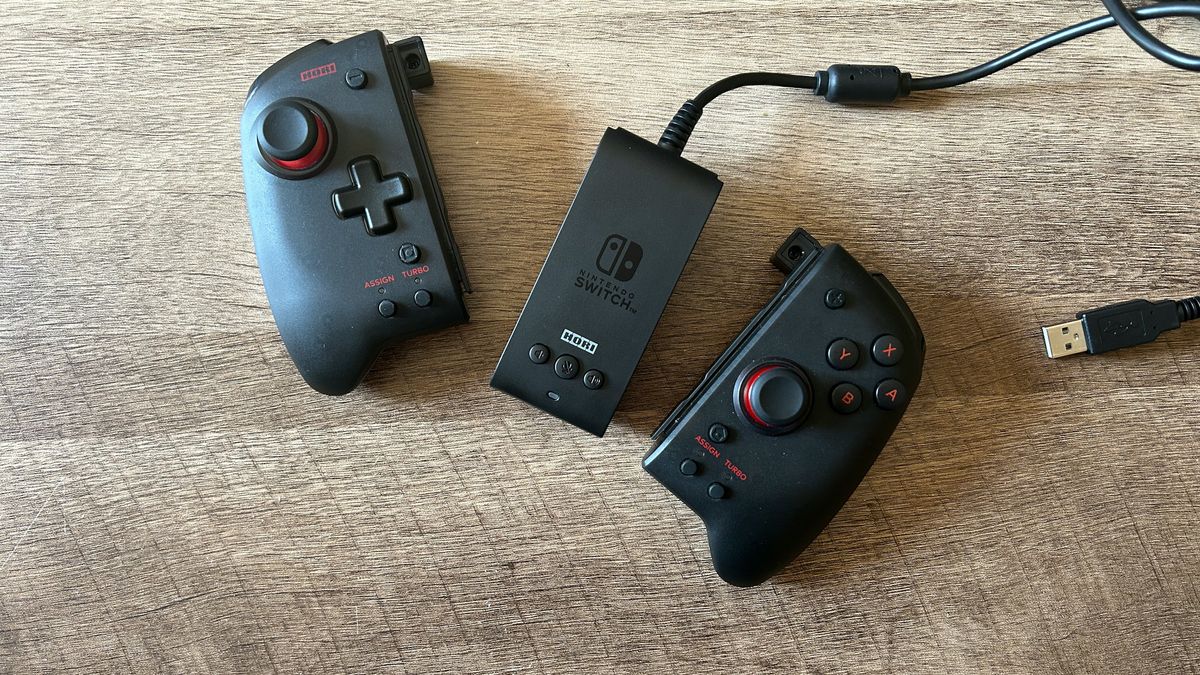GamesRadar+ Verdict
The Hori Split Pad Pro is an excellent Joy-Con alternative, offering far greater comfort and extra precision. The handheld player is going to get a lot more out of it, but with an attachment to suit the odd docked adventure you've got both bases covered. It's not an all-in-one solution, dropping wireless connection, NFC, rumble, and motion controls, but if you're after a more ergonomic experience the Split Pad Pro is the best in the business right now.
Pros
- +
Far more comfortable than Joy-Con
- +
Greater precision and accuracy
- +
Fantastic in handheld mode but attachment also works docked
- +
Remappable back paddles
- +
Turbo function
Cons
- -
Won't fit in a Nintendo Switch case
- -
No rumble, motion controls, or NFC
- -
Only works when connected to console or dock
Why you can trust GamesRadar+
The Hori Split Pad Pro is a must-see Joy-Con alternative. Launched by the brand a few years back, the split controller offered a low-cost, high-comfort set of handheld buttons to see players through a range of genres. Nintendo's Joy-Cons have always been geared towards the brand's younger audience, with their diminutive stature and skinny form factor. Hori knows that we grown-ups want to play too.
The only thing holding the Split Pad Pro back in those early days was the fact that it was limited to handheld-only use. Now we've got the Attachment Set, a package that ships both the Split Pad Pro controllers and a wired attachment to cable up to your dock for the big-screen treatment.
At $79.99 / £69.99 for the full set (the controllers by themselves come in at $49.99 / £39.99 day to day), this is a purchase on par with a new set of Nintendo clickers - if slightly higher than the official set during sales. With a few features removed, but a far more ergonomic form factor, I took the Hori Split Pad Pro Attachment set out for a spin to see whether it can truly shine as one of the best Nintendo Switch controllers out there.
| Price | $79.99 / £69.99 (full set) | $49.99 / £39.99 (controllers) |
| Connection | Direct attachment (controllers) | wired (attachment) |
| Buttons | 2x thumbsticks, Switch face buttons, d-pad, + / -, Home, Screenshot, 2x assignment, 2x turbo, 2x bumper, 2x trigger, 2x rear paddle, 2x volume (attachment), mic mute (attachment) |
| Remappable buttons | 2 |
| Headset connection | 3.5mm (attachment) |
| Dimensions | 65mm x 110mm x 28mm (per controller) | 42mm x 97mm x 29mm (attachment) |
| Weight | 80g (per controller) | 150g (attachment) |
Design
- Far more comfortable to play in handheld mode
- Larger form factor means greater precision
- Doesn't fit the majority of Switch cases
The Hori Split Pad Pro is all about its design. While it may be dropping a few core features from the Joy-Con, and doesn't particularly prioritize a speedy performance, far greater emphasis has been placed on making it as comfortable as possible. Switching from the Joy-Con to the Split Pad Pro for the first time was like sitting down after a long day standing. That instant relief was palpable. That comfort all comes down to the larger form factor, with real grips (complete with textured surface), legs, full-sized controls, and a chunkier build.
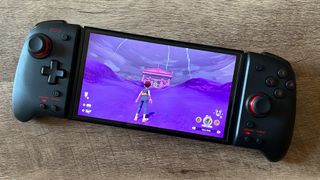
That meant I wasn't crowded around tiny buttons for hours on end, I could comfortably sit back and relax as the full device rested naturally in my palms. The two thumbsticks both also feel much easier to control. Whereas I previously played Doom on Switch out of necessity for testing, I actually came to enjoy FPS genres on the platform with this enhanced support. Larger bumpers and triggers meant I could reliably hit more reflex-demanding movements, and aiming and shooting both felt all the more satisfying.
This extends to the face buttons themselves. Hori's don't have that slightly sharp edge to them like the Joy-Con. Anyone who plays Mario Kart 8 Deluxe will recognize Joy-Con Thumb, a neat circular indentation on the skin after a particularly fraught race. That's completely gone here, with much softer and slightly rounded edges on this set of clickers.
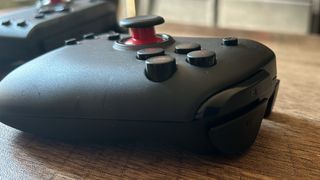
Everything else feels solid and secure, a dense plastic material houses the full chassis and is surprisingly fingerprint and smudge resistant in everyday use. Each controller glides into the side rails smoothly, with that classic click sound ringing through crisp as ever. Similarly, the attachment piece carries equally premium rails, which never flexed or wobbled when connecting or detaching.
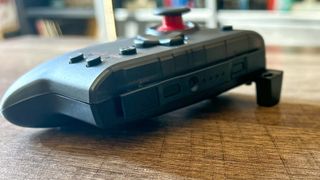
I received the black Hori Split Pad Pro, with red accents across lettering and underneath the thumbstick. However, there's a wide variety of different colorways to choose from, so you can tailor your experience to your favorite franchise as well. As for my more subtle model, I was pleased with the low profile look - this is a chunky device so anything the aesthetic design can do to tone things down is a blessing.
That said, the larger footprint might not be such a benefit if you're all about style. A very well Switch-versed visitor took one look at my unit on the table and exclaimed 'what is that?' It certainly kills that sleek Nintendo Switch vibe, with its bulbous architecture and heft but I'm happy to sacrifice looks for this comfort. Portability is another question. Your console will no longer fit into a Nintendo Switch case with the Split Pad Pro controllers attached (though it will slot into a dock). That meant I was transporting the controllers loose in a backpack as they are also too large to fit into accessory pouches on the majority of clamshell carriers.
Features
- Assignable back paddles are nice to have
- Turbo controls work flawlessly with three different speeds
- No rumble, NFC, or wireless connection
It's true, the Hori Split Pad Pro is a little light on features. Sacrificing a few of the Joy-Cons' most impressive additional extras, these clickers aren't for those looking to draw the most immersive experience out of their console. There's no HD rumble, which I did start to miss in Pokemon Legends: Arceus, no NFC, and no wireless connection. These gamepads will only work when connected directly to the Nintendo Switch system itself, or via the included attachment accessory. No more passing controllers among friends or motion control. The Split Pad Pro isn't a full Joy-Con replacement, then. You'll need the real deal if you're going to be taking up other Nintendo Switch accessories like Ring Fit Adventure, or playing Switch Sports, for example.
However, you are picking up an alternative set of features that might be more applicable to your playstyle. There are two back paddle buttons here, which can be remapped quickly and easily on the controller itself using the dedicated Assign button on each side.
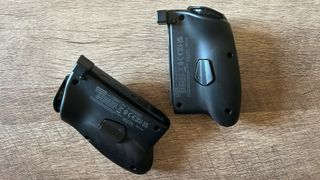
You'll be able to remap functions from all buttons barring home, +/-, turbo, and screenshot to these back paddles simply by holding the Assign button and the function of your choosing at the same time. I managed to switch things up on the left controller immediately, but the right took a little more convincing. For some reason, I couldn't quite get a reliable remap without some fiddling and multiple tries on the right controller, though always got there in the end.
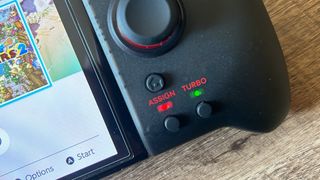
The turbo function takes me right back to my MadCatz PS2 days, but things have progressed since then. Assigning the turbo function is just as simple as remapping, and worked straight out of the box every time. Plus, you can choose between three different speeds for your repeat presses as well.
The attachment piece also adds a handy suite of volume and mic mute controls into the mix, but that's largely your lot. If you're a fan of FPS and online shooters, these turbo and remapping functions are going to work a lot harder for you, and are a worthy trade-off for wireless functionality, rumble, and motion controls. However, it's well worth checking your collection before buying - if you're relying on Joy-Con specific features you'd be better off sticking with the OGs.
Performance
- More precise, satisfying thumb sticks than Joy-Con
- Larger triggers offer a better FPS experience
- Back paddles might not see too much use depending on genre
With the additional size and extra spacing, it's no wonder the Hori Split Pad Pro feels great to use. However, everything is also nicely responsive with satisfying snaps and clicks, and just the right amount of resistance behind the d-pad and thumbsticks. While compatible with PC (via the attachment), it's not going to be fast enough for competitive play, but its main Nintendo Switch audience will be well served by the performance here.
Those roomier triggers make aiming and shooting far more reliable and precise across Fortnite and Doom, but even smaller actions like sprinting in Dragon Quest: Builders 2 felt more responsive. That accuracy is carried through to the thumbsticks. Joy-Con sticks have always felt particularly inaccurate to me, so I was pleased to find that the Hori feels like the more precise Pro controller's inputs. My aim and reactions were far tighter in Pokemon Legends Arceus, and quickly navigating more fiddly song menus in Fuser was far easier.
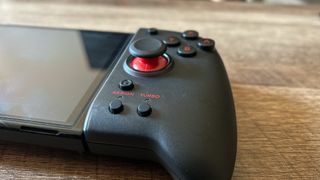
The majority of players might not see much action out of turbo mode and the remappable back buttons. I certainly found them handy for Fortnite and dabbled in Mario Kart 8 Deluxe and Doom, but the vast majority of titles I used didn't require such grand control schemes. Certainly, first-party Nintendo Switch games aren't going to require this level of extra finesse.
The attachment works exactly as you would expect, wiring straight into the dock and working as a comfortable wedge between the two controller sides. This was never finicky, and everything connected just as it should during quicker setups.
Should you buy the Hori Split Pad Pro?
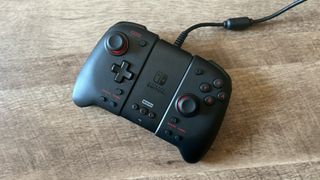
There's no getting around it. At $79.99 / £69.99, the Hori Split Pad Pro is expensive for what it is, especially when you're buying both the side controllers and attachment piece together. However, it's well worth investing in the full attachment set if you can find a good sale price.
By themselves, the gamepads retail at around $40- $50 / £40 when taking discounts - and that's an excellent price for anyone who plays mostly handheld. I would thoroughly encourage anyone in this situation to consider picking up the Split Pad Pro. The extra comfort, more precise controls, and all-around cozier feel makes for a far more luxurious Nintendo Switch experience, for less than the standard Joy-Con price. It's a no-brainer if, like me, you seldom plug into the TV.
I had to force myself to play docked to test the attachment setup. There's much better value for money in the controllers themselves than in the full attachment set, but it's certainly a viable buy if you split your time equally. It's more expensive than picking up a Pro controller, but you're covering yourself for all aspects of solo play.
It should be noted that if you're looking to pick up a wad of multiplayer options, the Hori Split Pad Pro isn't for you. The lack of wireless connection will shoot that idea to the ground, and I'd recommend looking into some of the cheaper, smaller 8BitDo options instead.
How we tested the Hori Split Pad Pro
I used the Hori Split Pad Pro for two weeks, using the two controllers for handheld play and hooking up to the attachment piece for docked mode. I played Doom, Dragon Quest: Builders 2 and Fortnite both handheld and docked, while also playing Pokemon Legends: Arceus, Mario Kart 8 Deluxe, and Super Mario Galaxy in handheld mode. For more information on how we test controllers, check the full GamesRadar+ Hardware Policy.
For more kit, we're also rounding up the best Nintendo Switch chargers and the best Nintendo Switch memory cards. Or, take a look at the latest Nintendo Switch bundles if you're yet to get your hands on a console.

Managing Editor of Hardware at GamesRadar+, I originally landed in hardware at our sister site TechRadar before moving over to GamesRadar. In between, I've written for Tom’s Guide, Wireframe, The Indie Game Website and That Video Game Blog, covering everything from the PS5 launch to the Apple Pencil. Now, i'm focused on Nintendo Switch, gaming laptops (and the keyboards, headsets and mice that come with them), PS5, and trying to find the perfect projector.

If Assassin's Creed Shadows' delay means lessons have been learned from Star Wars Outlaws, I say: let Ubisoft cook
Marvel Rivals Battle Pass explained and how to claim rewards
It took 490 days, but the Super Mario Bros speedrun world record is now 4 frames better – and just 18 frames away from literal perfection
Most Popular

